2023届中考英语语法专项复习之:现在完成时现在完成进行时课件(共53张PPT)
文档属性
| 名称 | 2023届中考英语语法专项复习之:现在完成时现在完成进行时课件(共53张PPT) |  | |
| 格式 | ppt | ||
| 文件大小 | 1.4MB | ||
| 资源类型 | 教案 | ||
| 版本资源 | 通用版 | ||
| 科目 | 英语 | ||
| 更新时间 | 2022-09-12 20:10:49 | ||
图片预览

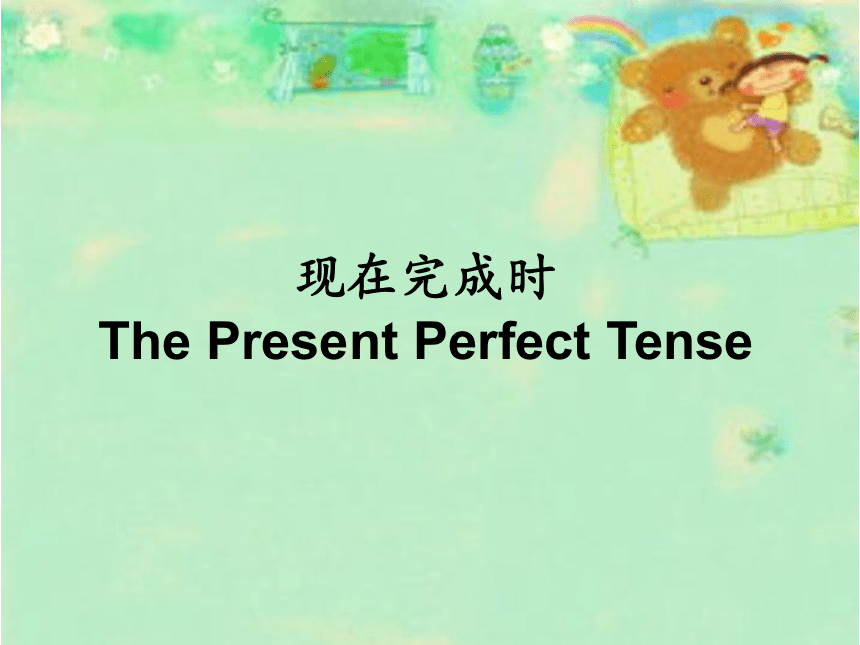
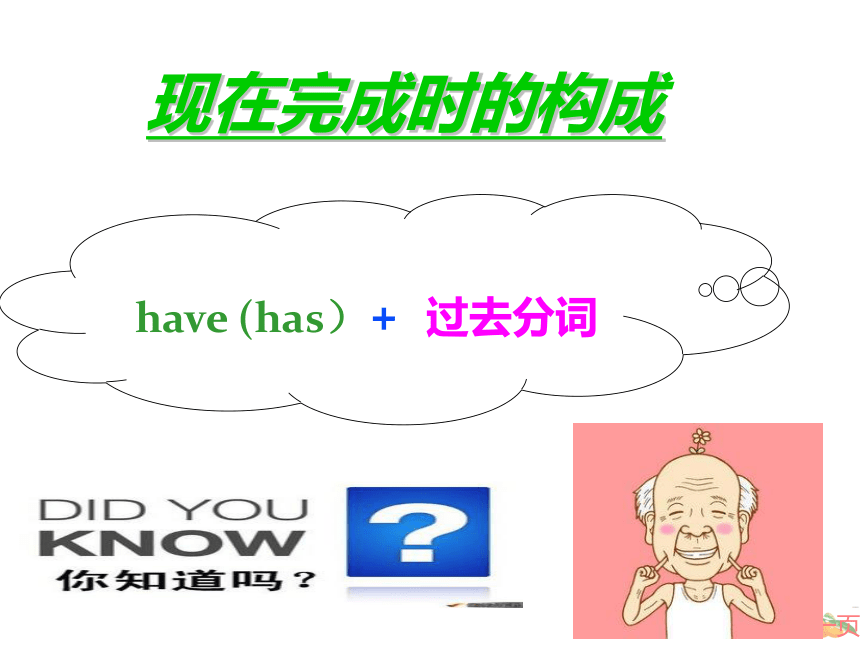
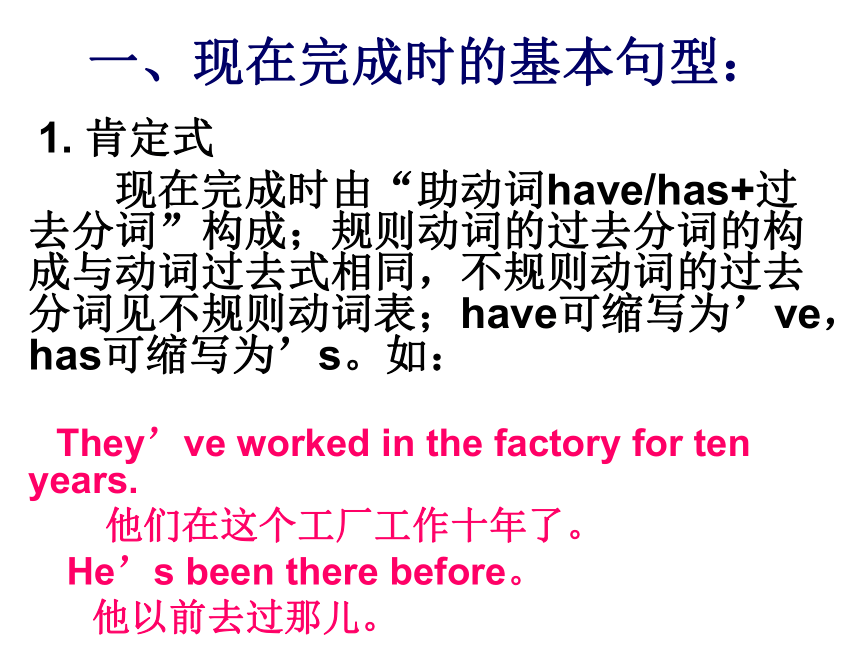
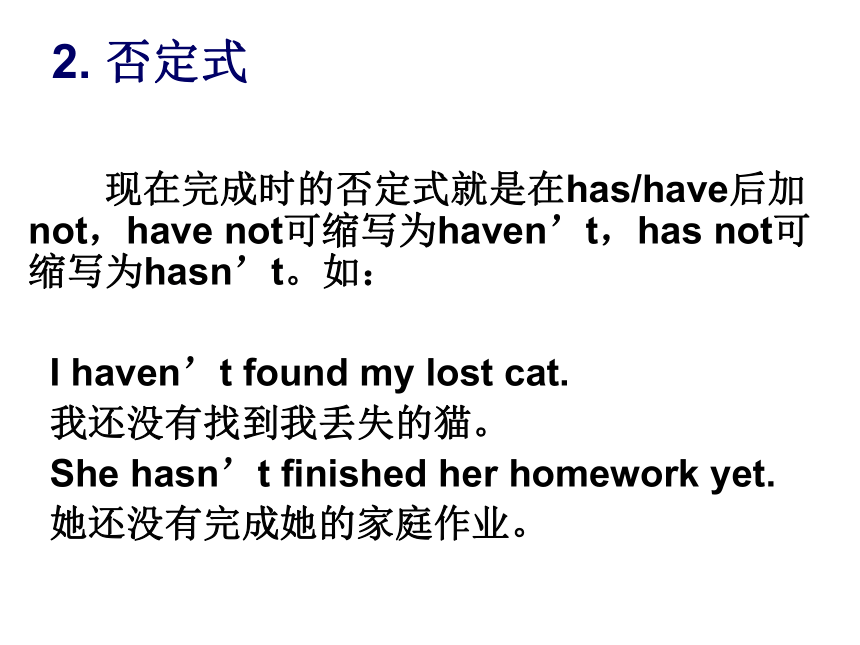
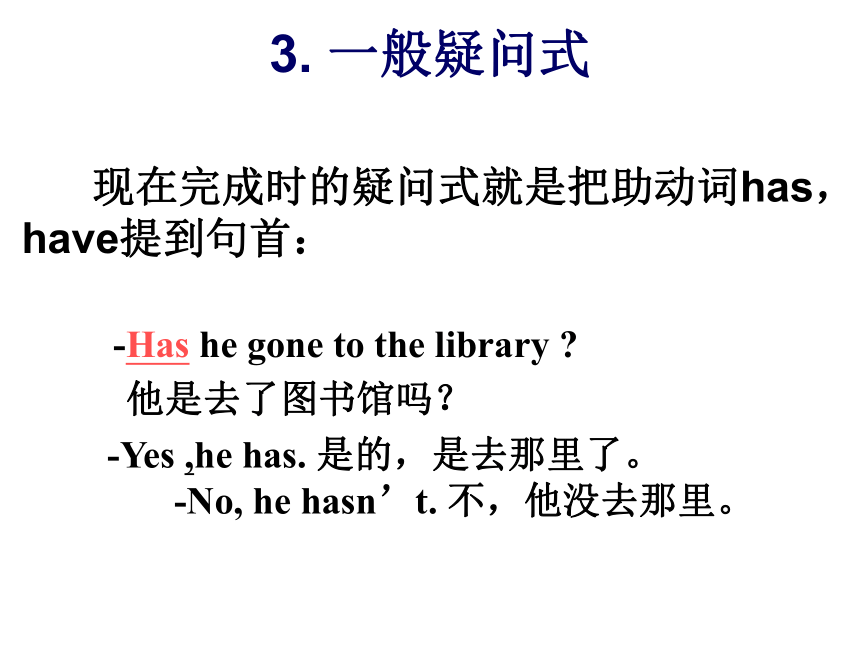
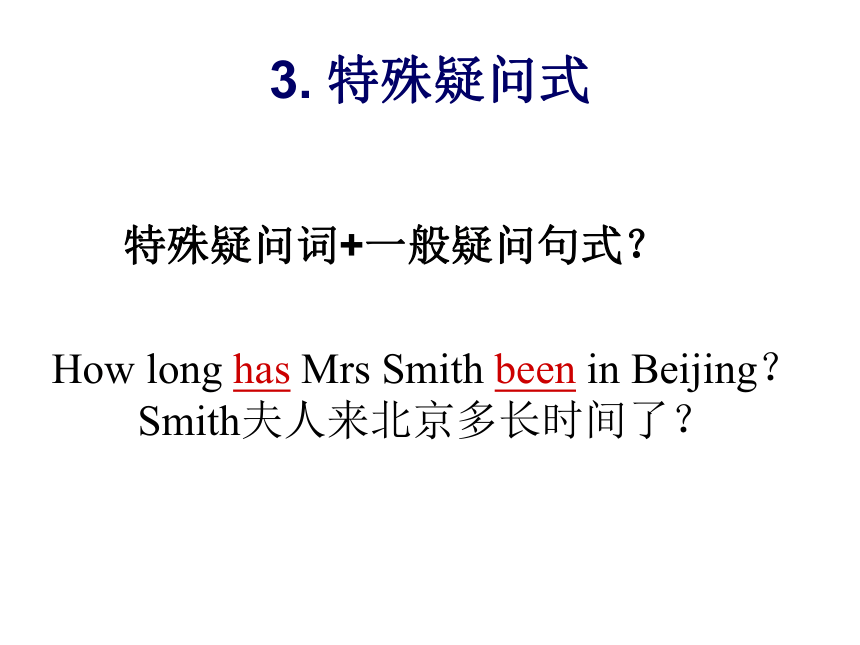
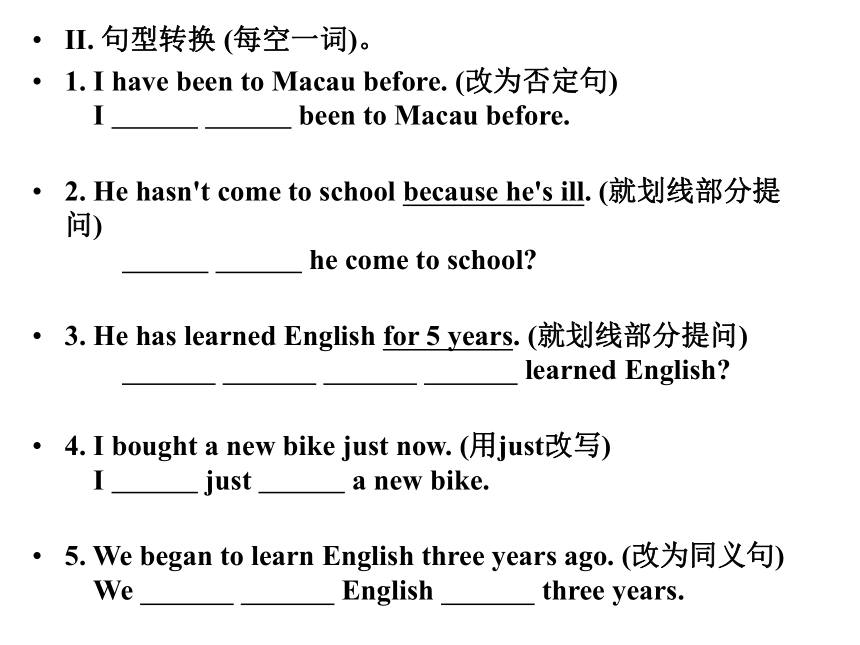
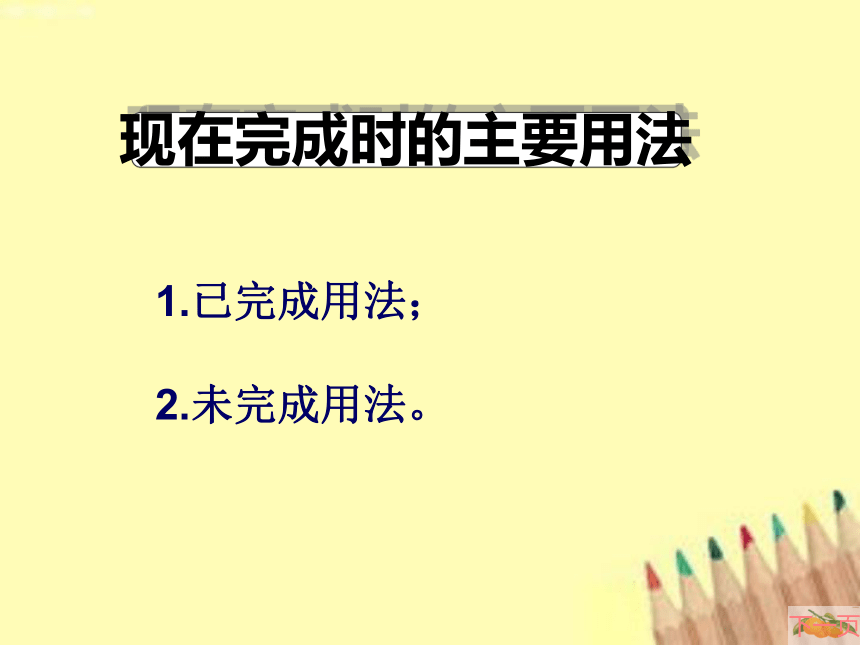
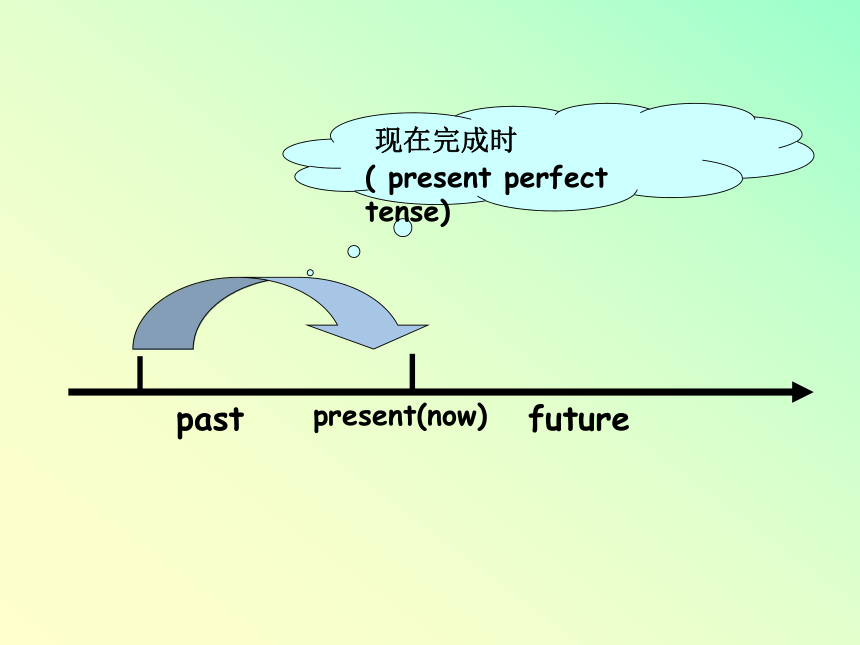
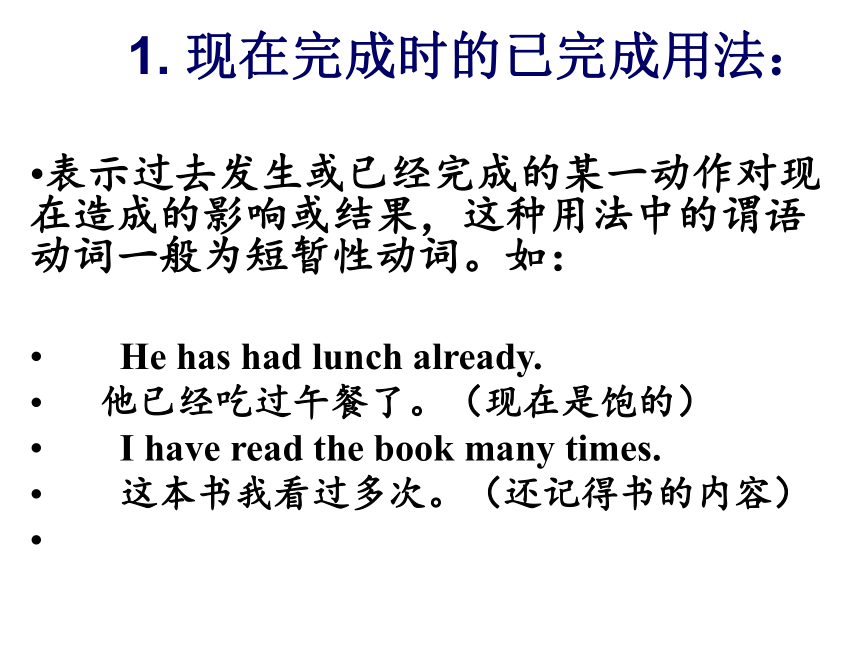
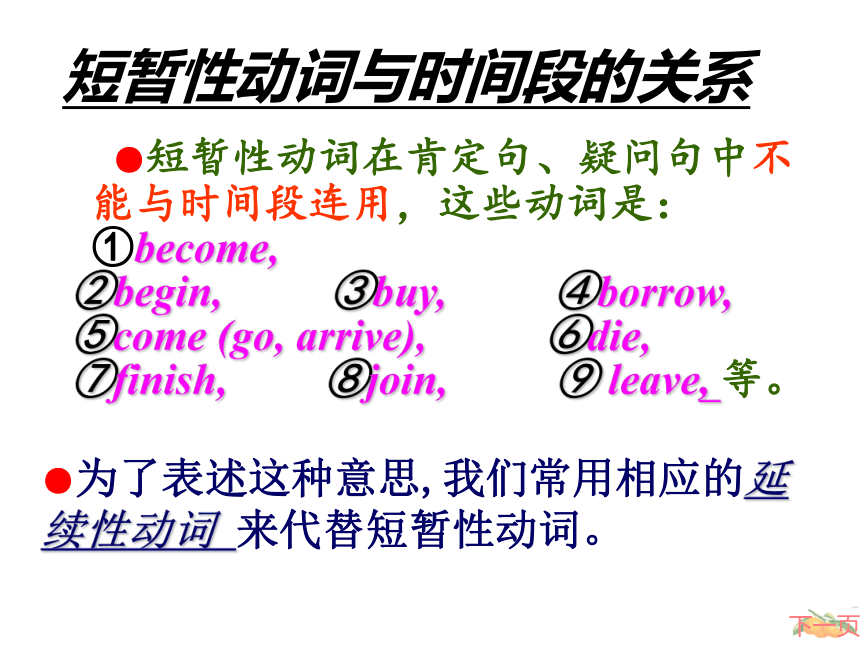
文档简介
(共53张PPT)
8.5 现在完成时和现在完成进行时
现在完成时
The Present Perfect Tense
现在完成时的构成
下一页
have (has)+ 过去分词
一、现在完成时的基本句型:
1. 肯定式
现在完成时由“助动词have/has+过去分词”构成;规则动词的过去分词的构成与动词过去式相同,不规则动词的过去分词见不规则动词表;have可缩写为’ve,has可缩写为’s。如:
They’ve worked in the factory for ten years.
他们在这个工厂工作十年了。
He’s been there before。
他以前去过那儿。
2. 否定式
现在完成时的否定式就是在has/have后加not,have not可缩写为haven’t,has not可缩写为hasn’t。如:
I haven’t found my lost cat.
我还没有找到我丢失的猫。
She hasn’t finished her homework yet.
她还没有完成她的家庭作业。
3. 一般疑问式
现在完成时的疑问式就是把助动词has,have提到句首:
-Has he gone to the library
他是去了图书馆吗?
-Yes ,he has. 是的,是去那里了。 -No, he hasn’t. 不,他没去那里。
3. 特殊疑问式
特殊疑问词+一般疑问句式?
How long has Mrs Smith been in Beijing? Smith夫人来北京多长时间了?
II. 句型转换 (每空一词)。
1. I have been to Macau before. (改为否定句) I been to Macau before.
2. He hasn't come to school because he's ill. (就划线部分提问) he come to school
3. He has learned English for 5 years. (就划线部分提问) learned English
4. I bought a new bike just now. (用just改写) I just a new bike.
5. We began to learn English three years ago. (改为同义句) We English three years.
下一页
现在完成时的主要用法
1.已完成用法;
2.未完成用法。
present(now)
future
past
现在完成时
( present perfect tense)
1. 现在完成时的已完成用法:
表示过去发生或已经完成的某一动作对现在造成的影响或结果,这种用法中的谓语动词一般为短暂性动词。如:
He has had lunch already.
他已经吃过午餐了。(现在是饱的)
I have read the book many times.
这本书我看过多次。(还记得书的内容)
短暂性动词与时间段的关系
●短暂性动词在肯定句、疑问句中不能与时间段连用,这些动词是:①become,
②begin, ③buy, ④borrow,
⑤come (go, arrive), ⑥die,
⑦finish, ⑧join, ⑨ leave, 等。
下一页
●为了表述这种意思,我们常用相应的延续性动词 来代替短暂性动词。
※短暂性动词与延续动词间的转换
leave--
come/go (to) --
arrive (at/in)--
get (to)--
reach--
buy--
borrow--
finish--
join--
start/begin--
die--
close--
open--
return--
marry--
become--
be away (from)
be (in/at)
be (in/at)
be (in/at)
be (in/at)
have
keep
be over
be in/be a/an…
be on
be dead
be closed
be open
be back
be married
be
become →be, begin→ have ,
borrow → keep, buy → have,
come (go, arrive, get) →be here/there/in…,
die→ be dead, finish→ be over,
join→ be in …(be a member of … )
leave→ be away ( from…),
下一页
改 错
1. How long have you begun to study English
2. I have borrowed this book for two weeks.
3. The river has become very dirty since last August.
4. Our manager is away today. He has been to Guangzhou on business.
5. He has gone out for two years.
studied
kept
been
gone
been
下一页
上一页
主菜单
●但在否定句中,短暂性动词可以与时间段连用。
如:I haven’t bought the bike for a year.
我买这辆自行车还不到一年。
She hasn’t come here for an hour.
她来这儿还没有一个小时。
下一页
下一页
I have learnt English for more than
ten years.我已经学了10多年的英语。
(从10年前开始,持续到现在还在学)
She has swum since half an hour ago.
我已经游泳了半个小时
(半个小时前已经开始游泳,到现在还在游)
2.现在完成时的未完成用法
2.表示过去已经开始, 持续到现在的动作或状态.这种用法中的谓语动词一般为延续性动词。常与since + 过去的时间点,for + 一段时间,so far 等时间状语连用。
for与since的区别
for为介词,后面要接“段时间”;since用作介词,后接过去时间点。如:
I have known him for three years.
我认识他有三年了。
We have lived here since 1998.
我们从1998年就住在这里了。
1.for +
Eg. I have been here for 5 weeks.
He’s studied English for 3 years.
一段时间
2. since +
从句(一般过去时)
单词
词组
(表示过去某一时间的)时间点
Eg. I have been here since 2000.
I have been here since 5 years ago.
I have been here since I graduated in 2000.
since: (自…以来)
1)since+时间点
He has stayed here since 5 o’clock.
2)since+ 时间段+ ago
He has stayed here since 5 hours ago.
3)since+ 从句
She has taught English since he came here.
for: (长达)
for+ 时间段
He has kept the book for 2 weeks.
since , for 的用法:
Take notes
注1): since 也可单独使用, 表示“自那时起”; 另外since前也可加上ever,以加强语气.
Eg. I have been here (ever) since.
I have been here (ever) since I graduated in 2000.
注2): 对for或since引导的时间状语提问 必须用how long, 决不能用when.
Eg. I have lived here for 10 years.
How long have you lived here
She has stood here since 2 hour ago.
How long has she stood here
选用 for和 since填空:
1.We haven’t seen each other ______ a long time.
2.His father has been in the Party ______ 10 years ago.
3.The film has been on ______ 20 minutes.
4.Mr Green has worked here ______ he came to China.
5.His grandparents have been dead ______ several years.
6. It’s five years _______ we met last time.
for
since
for
since
for
since
下一页
上一页
主菜单
现在完成时的时间状语
◆常与①already, ②never,
③ever, ④just,
⑤yet, ⑥before,
⑦up to now, ⑧so far,
⑨for the last few weeks
⑩these days,
⑾since
⑿for a long time
连用
下一页
四、区别
1. 一些时间状语副词的用法区别
① yet,already,just与ever
(1). yet在现在完成时中的用法
否定句:句末 “还(没)”
疑问句: 句末 “己经”
Eg. I haven’t had breakfast yet.
Have you had breakfast yet
(2)already 往往用于肯定句,用在疑问句时表示强 调或加强语气;yet 用于否定句和疑问句。
He has already left here. 他已经离开这里了。
Has he already left here 他(真的)已经离开这里了吗?(表示加强语气)
My teachers haven’t had breakfast yet. 我的老师们还没有吃早饭。
Have you written to your parents yet 你已经给你父母写过信了吗?
(3) just表示“刚刚”(用于完成时态时,与already,never 等副词的位置一样,多用在助动词have/has和动词过去分词之间)
He has just come back. 他刚刚回来。
They have just finished the work. 他们刚刚完成那项工作。
(4) never 是否定词,表示“从来没有”,而ever 表示“曾经”
We have never been to the Great Wall. 我们从来没有去过长城。
Have you ever been to Canada 你们曾经去过加拿大吗?
② before与ago,just与just now
before表示现在看来的“以前”,常单独用于现在完成时中,一般不与表示一段时间的词语连用,而ago表示在过去某时间的“以前”,常用“一段时间+ago”的形式,与过去时连用;just常与现在完成时连用,多用于句中助动词之后修饰谓语动词,just now多与一般过去时连用,一般用于句末。如:
Have you met him before
你以前见过他吗?
My brother met her in the street two days ago.
我哥哥两天前在街上遇到了她。
I have just had breakfast.
我刚吃过早餐。
She had breakfast just now.
她刚吃了早餐。
与一般过去时的用法比较
1.现在完成时和一般过去时都是说过去的事情,但现在完成时注意的不是事情本身,而是强调事情与现在保持的某种密切联系(如现在的结果,影响,一直延续到现在等);
而一般过去时,则只讲述发生在过去的动作和事情与现在没有关系。
下一页
eg:He has bought an English-Chinese
dictionary. 他已经买了一本英汉字典。
He bought an English-Chinese
dictionary. 他曾买过一本英汉字典。
下一页
第一句用现在完成时时态,想表达意为:“He bought an English-Chinese dictionary. And he still has it” “过去他买了一本英汉字典,现在他还有这本字典” 。
第二句用过去时只叙述过去他买过一本英汉字典这一事实,至于现在他是否有这本字典并未强
调说明。
2.当有一个表示过去某一特定时间的状语时,不用现在完成时,而用一般过去时:
下一页
eg: I saw the film on television yesterday .
但since(自…以来)+某一过去时间或叙述过去事情的从句总是与现在完成时连用。
eg: They have known each other since 1950 .
Since he was a child ,he has lived in England.
3.常与一般过去时连用的典型的
表示过去时间的状语:
下一页
yesterday(昨天), the day before yesterday(前天),
just now(刚才), 时间+ ago,
last +时间 等;
eg: The plane took off ten minutes ago.
We finished our task last week .
1. have (has) been to与have (has) gone to的区别
have (has) been to表示已经去过某地,人离开了某地,已经返回,人对该地已有(或没有)经历或体验;have (has) gone to表示人已经去了某地,人不在说话地。如:
He has been to Japan twice.
他去过日本两次。
—Where is Jim 吉姆在哪儿?
—He has gone to the post office.
他去了邮电所。
有关现在完成时的几个问题
have been in 意思是“呆在某处一段时间了”
下一页
用Have been to, have gone to,
have been in 填空
Mike and his parents __________ the north for half a year.
Mum is not at home now. she _________ the shop.
______ you ever _____ to kunming Never.
Where _____ you ______ these days
Has Jim arrived yet
Yes, he _______ here for several days.
Where is Peter I don’t know where he ________.
Hi Jim! Where _____ you _____ Li Lei
is looking for you.
have been in
has gone to
have been
Have been
has been
has gone
have been
下一页
上一页
主菜单
2)由since引导的从句中的时态
由since引导的从句一般用过去时(主句谓语用现在完成时)
eg. Much has changed since I was there last time.
自我上次到那里之后发生了许多变化。
3)在时间及条件从句中需用现在完成时代替将来完成时:
eg.I'll write a preface when I've finished the book.
书写完后我将写一篇序。
4)和time一道用的情况:
eg.This(It) is the first time I have seen a pagoda.
这是我首次看到宝塔。
5)have got的特殊用法:
have got在形式上是现在完成时,在意思上却和have相同。
eg.She hasn't got any relations.
她没有什么亲属。
6)have got to和have to 意思相同:
have got to 和have to 意思一样,表示“不得不”
eg.You've got to be careful.
你得当心。
现在完成进行时:
一.构成:have/has+been+v-ing形式
二.用法:表示一个持续到现在的动作(这动作可能刚停止,也可能还在进行)
eg. I've been waiting for an hour and he still hasn't turned up.
我等了一个钟头,他还没来。
常和how long,long这类状语一起用
How long have you been wearing glasses
你戴眼镜有多少年头了?
现在完成时和现在完成进行时的区别 I
(1)表示从过去某一时间开始一直在进行的动作, 并有可能持续下去, 强调动作的全过程;
表示从过去到现在的重复性动作。
(2)注意:多用于延续性动词,如work, live, study, skate, collect…
表示在某一特定时间之前曾经发生过的动作,或者到这一时间为止已经完成的动作.
1.现在完成时: have + 过去分词
2.现在完成进行时:have + been +现在分词
现在完成时和现在完成进行时的主要区别
现在完成进行时着重表示动作的延续性,而
现在完成时着重表示动作的结果。
She has read this book.
She has been reading this book.
I have worked here for three years.
I have been working here for 3 years.
现在完成时和现在完成进行时的区别 II
(1)在不用时间状语的情况下,现在完成进行时表示动作仍在进行。而现在完成时则表示动作在过去已结束。如: The students have been preparing for the exam.
(还在进行)学生们一直在准备考试。
The students have prepared for the exam.
(已经结束)学生们为考试作了准备。
(2)在强调指出动作还未结束,还要继续下去。如:
I’ve been reading this book for two hours, but
I haven’t finished it.
这本书我已读了两个小时了,但我还没读完。 I’ve read this book.
我已读完这本书了。
现在完成时和现在完成进行时的区别 II
(3)有些表示状态、感情、感觉的静态动词,如:have, like, hate, hear, know, sound等动词不能用于现在完成进行时,但可用于现在完成时。如: They’ve known each other since 1970.
自从1970年起他们就相互认识了。
(4)现在完成进行时也可表示现在以前这段时间反复发生的事情。如:
We’ve been seeing each other quite a lot recently.
最近我们经常见面。
Make sentences with “when” and “while”
2. Recite the Paragraph 1 and 2
Thank you!
8.5 现在完成时和现在完成进行时
现在完成时
The Present Perfect Tense
现在完成时的构成
下一页
have (has)+ 过去分词
一、现在完成时的基本句型:
1. 肯定式
现在完成时由“助动词have/has+过去分词”构成;规则动词的过去分词的构成与动词过去式相同,不规则动词的过去分词见不规则动词表;have可缩写为’ve,has可缩写为’s。如:
They’ve worked in the factory for ten years.
他们在这个工厂工作十年了。
He’s been there before。
他以前去过那儿。
2. 否定式
现在完成时的否定式就是在has/have后加not,have not可缩写为haven’t,has not可缩写为hasn’t。如:
I haven’t found my lost cat.
我还没有找到我丢失的猫。
She hasn’t finished her homework yet.
她还没有完成她的家庭作业。
3. 一般疑问式
现在完成时的疑问式就是把助动词has,have提到句首:
-Has he gone to the library
他是去了图书馆吗?
-Yes ,he has. 是的,是去那里了。 -No, he hasn’t. 不,他没去那里。
3. 特殊疑问式
特殊疑问词+一般疑问句式?
How long has Mrs Smith been in Beijing? Smith夫人来北京多长时间了?
II. 句型转换 (每空一词)。
1. I have been to Macau before. (改为否定句) I been to Macau before.
2. He hasn't come to school because he's ill. (就划线部分提问) he come to school
3. He has learned English for 5 years. (就划线部分提问) learned English
4. I bought a new bike just now. (用just改写) I just a new bike.
5. We began to learn English three years ago. (改为同义句) We English three years.
下一页
现在完成时的主要用法
1.已完成用法;
2.未完成用法。
present(now)
future
past
现在完成时
( present perfect tense)
1. 现在完成时的已完成用法:
表示过去发生或已经完成的某一动作对现在造成的影响或结果,这种用法中的谓语动词一般为短暂性动词。如:
He has had lunch already.
他已经吃过午餐了。(现在是饱的)
I have read the book many times.
这本书我看过多次。(还记得书的内容)
短暂性动词与时间段的关系
●短暂性动词在肯定句、疑问句中不能与时间段连用,这些动词是:①become,
②begin, ③buy, ④borrow,
⑤come (go, arrive), ⑥die,
⑦finish, ⑧join, ⑨ leave, 等。
下一页
●为了表述这种意思,我们常用相应的延续性动词 来代替短暂性动词。
※短暂性动词与延续动词间的转换
leave--
come/go (to) --
arrive (at/in)--
get (to)--
reach--
buy--
borrow--
finish--
join--
start/begin--
die--
close--
open--
return--
marry--
become--
be away (from)
be (in/at)
be (in/at)
be (in/at)
be (in/at)
have
keep
be over
be in/be a/an…
be on
be dead
be closed
be open
be back
be married
be
become →be, begin→ have ,
borrow → keep, buy → have,
come (go, arrive, get) →be here/there/in…,
die→ be dead, finish→ be over,
join→ be in …(be a member of … )
leave→ be away ( from…),
下一页
改 错
1. How long have you begun to study English
2. I have borrowed this book for two weeks.
3. The river has become very dirty since last August.
4. Our manager is away today. He has been to Guangzhou on business.
5. He has gone out for two years.
studied
kept
been
gone
been
下一页
上一页
主菜单
●但在否定句中,短暂性动词可以与时间段连用。
如:I haven’t bought the bike for a year.
我买这辆自行车还不到一年。
She hasn’t come here for an hour.
她来这儿还没有一个小时。
下一页
下一页
I have learnt English for more than
ten years.我已经学了10多年的英语。
(从10年前开始,持续到现在还在学)
She has swum since half an hour ago.
我已经游泳了半个小时
(半个小时前已经开始游泳,到现在还在游)
2.现在完成时的未完成用法
2.表示过去已经开始, 持续到现在的动作或状态.这种用法中的谓语动词一般为延续性动词。常与since + 过去的时间点,for + 一段时间,so far 等时间状语连用。
for与since的区别
for为介词,后面要接“段时间”;since用作介词,后接过去时间点。如:
I have known him for three years.
我认识他有三年了。
We have lived here since 1998.
我们从1998年就住在这里了。
1.for +
Eg. I have been here for 5 weeks.
He’s studied English for 3 years.
一段时间
2. since +
从句(一般过去时)
单词
词组
(表示过去某一时间的)时间点
Eg. I have been here since 2000.
I have been here since 5 years ago.
I have been here since I graduated in 2000.
since: (自…以来)
1)since+时间点
He has stayed here since 5 o’clock.
2)since+ 时间段+ ago
He has stayed here since 5 hours ago.
3)since+ 从句
She has taught English since he came here.
for: (长达)
for+ 时间段
He has kept the book for 2 weeks.
since , for 的用法:
Take notes
注1): since 也可单独使用, 表示“自那时起”; 另外since前也可加上ever,以加强语气.
Eg. I have been here (ever) since.
I have been here (ever) since I graduated in 2000.
注2): 对for或since引导的时间状语提问 必须用how long, 决不能用when.
Eg. I have lived here for 10 years.
How long have you lived here
She has stood here since 2 hour ago.
How long has she stood here
选用 for和 since填空:
1.We haven’t seen each other ______ a long time.
2.His father has been in the Party ______ 10 years ago.
3.The film has been on ______ 20 minutes.
4.Mr Green has worked here ______ he came to China.
5.His grandparents have been dead ______ several years.
6. It’s five years _______ we met last time.
for
since
for
since
for
since
下一页
上一页
主菜单
现在完成时的时间状语
◆常与①already, ②never,
③ever, ④just,
⑤yet, ⑥before,
⑦up to now, ⑧so far,
⑨for the last few weeks
⑩these days,
⑾since
⑿for a long time
连用
下一页
四、区别
1. 一些时间状语副词的用法区别
① yet,already,just与ever
(1). yet在现在完成时中的用法
否定句:句末 “还(没)”
疑问句: 句末 “己经”
Eg. I haven’t had breakfast yet.
Have you had breakfast yet
(2)already 往往用于肯定句,用在疑问句时表示强 调或加强语气;yet 用于否定句和疑问句。
He has already left here. 他已经离开这里了。
Has he already left here 他(真的)已经离开这里了吗?(表示加强语气)
My teachers haven’t had breakfast yet. 我的老师们还没有吃早饭。
Have you written to your parents yet 你已经给你父母写过信了吗?
(3) just表示“刚刚”(用于完成时态时,与already,never 等副词的位置一样,多用在助动词have/has和动词过去分词之间)
He has just come back. 他刚刚回来。
They have just finished the work. 他们刚刚完成那项工作。
(4) never 是否定词,表示“从来没有”,而ever 表示“曾经”
We have never been to the Great Wall. 我们从来没有去过长城。
Have you ever been to Canada 你们曾经去过加拿大吗?
② before与ago,just与just now
before表示现在看来的“以前”,常单独用于现在完成时中,一般不与表示一段时间的词语连用,而ago表示在过去某时间的“以前”,常用“一段时间+ago”的形式,与过去时连用;just常与现在完成时连用,多用于句中助动词之后修饰谓语动词,just now多与一般过去时连用,一般用于句末。如:
Have you met him before
你以前见过他吗?
My brother met her in the street two days ago.
我哥哥两天前在街上遇到了她。
I have just had breakfast.
我刚吃过早餐。
She had breakfast just now.
她刚吃了早餐。
与一般过去时的用法比较
1.现在完成时和一般过去时都是说过去的事情,但现在完成时注意的不是事情本身,而是强调事情与现在保持的某种密切联系(如现在的结果,影响,一直延续到现在等);
而一般过去时,则只讲述发生在过去的动作和事情与现在没有关系。
下一页
eg:He has bought an English-Chinese
dictionary. 他已经买了一本英汉字典。
He bought an English-Chinese
dictionary. 他曾买过一本英汉字典。
下一页
第一句用现在完成时时态,想表达意为:“He bought an English-Chinese dictionary. And he still has it” “过去他买了一本英汉字典,现在他还有这本字典” 。
第二句用过去时只叙述过去他买过一本英汉字典这一事实,至于现在他是否有这本字典并未强
调说明。
2.当有一个表示过去某一特定时间的状语时,不用现在完成时,而用一般过去时:
下一页
eg: I saw the film on television yesterday .
但since(自…以来)+某一过去时间或叙述过去事情的从句总是与现在完成时连用。
eg: They have known each other since 1950 .
Since he was a child ,he has lived in England.
3.常与一般过去时连用的典型的
表示过去时间的状语:
下一页
yesterday(昨天), the day before yesterday(前天),
just now(刚才), 时间+ ago,
last +时间 等;
eg: The plane took off ten minutes ago.
We finished our task last week .
1. have (has) been to与have (has) gone to的区别
have (has) been to表示已经去过某地,人离开了某地,已经返回,人对该地已有(或没有)经历或体验;have (has) gone to表示人已经去了某地,人不在说话地。如:
He has been to Japan twice.
他去过日本两次。
—Where is Jim 吉姆在哪儿?
—He has gone to the post office.
他去了邮电所。
有关现在完成时的几个问题
have been in 意思是“呆在某处一段时间了”
下一页
用Have been to, have gone to,
have been in 填空
Mike and his parents __________ the north for half a year.
Mum is not at home now. she _________ the shop.
______ you ever _____ to kunming Never.
Where _____ you ______ these days
Has Jim arrived yet
Yes, he _______ here for several days.
Where is Peter I don’t know where he ________.
Hi Jim! Where _____ you _____ Li Lei
is looking for you.
have been in
has gone to
have been
Have been
has been
has gone
have been
下一页
上一页
主菜单
2)由since引导的从句中的时态
由since引导的从句一般用过去时(主句谓语用现在完成时)
eg. Much has changed since I was there last time.
自我上次到那里之后发生了许多变化。
3)在时间及条件从句中需用现在完成时代替将来完成时:
eg.I'll write a preface when I've finished the book.
书写完后我将写一篇序。
4)和time一道用的情况:
eg.This(It) is the first time I have seen a pagoda.
这是我首次看到宝塔。
5)have got的特殊用法:
have got在形式上是现在完成时,在意思上却和have相同。
eg.She hasn't got any relations.
她没有什么亲属。
6)have got to和have to 意思相同:
have got to 和have to 意思一样,表示“不得不”
eg.You've got to be careful.
你得当心。
现在完成进行时:
一.构成:have/has+been+v-ing形式
二.用法:表示一个持续到现在的动作(这动作可能刚停止,也可能还在进行)
eg. I've been waiting for an hour and he still hasn't turned up.
我等了一个钟头,他还没来。
常和how long,long这类状语一起用
How long have you been wearing glasses
你戴眼镜有多少年头了?
现在完成时和现在完成进行时的区别 I
(1)表示从过去某一时间开始一直在进行的动作, 并有可能持续下去, 强调动作的全过程;
表示从过去到现在的重复性动作。
(2)注意:多用于延续性动词,如work, live, study, skate, collect…
表示在某一特定时间之前曾经发生过的动作,或者到这一时间为止已经完成的动作.
1.现在完成时: have + 过去分词
2.现在完成进行时:have + been +现在分词
现在完成时和现在完成进行时的主要区别
现在完成进行时着重表示动作的延续性,而
现在完成时着重表示动作的结果。
She has read this book.
She has been reading this book.
I have worked here for three years.
I have been working here for 3 years.
现在完成时和现在完成进行时的区别 II
(1)在不用时间状语的情况下,现在完成进行时表示动作仍在进行。而现在完成时则表示动作在过去已结束。如: The students have been preparing for the exam.
(还在进行)学生们一直在准备考试。
The students have prepared for the exam.
(已经结束)学生们为考试作了准备。
(2)在强调指出动作还未结束,还要继续下去。如:
I’ve been reading this book for two hours, but
I haven’t finished it.
这本书我已读了两个小时了,但我还没读完。 I’ve read this book.
我已读完这本书了。
现在完成时和现在完成进行时的区别 II
(3)有些表示状态、感情、感觉的静态动词,如:have, like, hate, hear, know, sound等动词不能用于现在完成进行时,但可用于现在完成时。如: They’ve known each other since 1970.
自从1970年起他们就相互认识了。
(4)现在完成进行时也可表示现在以前这段时间反复发生的事情。如:
We’ve been seeing each other quite a lot recently.
最近我们经常见面。
Make sentences with “when” and “while”
2. Recite the Paragraph 1 and 2
Thank you!
同课章节目录
- 词法
- 名词
- 动词和动词短语
- 动词语态
- 动词时态
- 助动词和情态动词
- 非谓语动词
- 冠词
- 代词
- 数词和量词
- 形容词副词及其比较等级
- 介词和介词短语
- 连词和感叹词
- 构词法
- 相似、相近词比较
- 句法
- 陈述句
- 一般疑问句和否定疑问句
- 特殊疑问句及选择疑问句
- 反意疑问句
- 存在句(There be句型)
- 宾语从句
- 定语从句
- 状语从句
- 主谓一致问题
- 简单句
- 并列句
- 复合句
- 主谓一致
- 主、表语从句
- 名词性从句
- 直接引语和间接引语
- 虚拟语气
- 感叹句
- 强调句
- 倒装句
- 祈使句
- 句子的成分
- 句子的分类
- 题型专区
- 单项选择部分
- 易错题
- 完形填空
- 阅读理解
- 词汇练习
- 听说训练
- 句型转换
- 补全对话
- 短文改错
- 翻译
- 书面表达
- 任务型阅读
- 语法填空
- 其他资料
